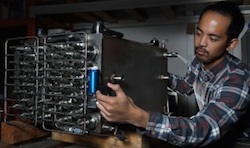Forklifts may soon be powered by zero-emission hydrogen fuel cell systems. Research being conducted by Sandia National Laboratory and Hawaii Hydrogen Carriers (HHC) are looking to design a solid-state hydrogen storage system that can refuel at low pressure four to five times faster than it takes to charge a battery-powered forklift, a $33 billion market in 2013 according to Pell Research. The researchers say this technology would give hydrogen a competitive advantage over batteries.
“Once you understand how these forklifts operate, the fuel cell advantage is clear,” said Sandia’s project manager Joe Pratt.
Pratt explains that refueling hydrogen fuel cell powered forklifts takes less than three minutes compared to the hours of recharging needed for battery-powered forklifts. In addition, fuel cell-powered forklifts are able to operate continuously for eight or more hours between fills. Whereas today companies using battery-powered forklifts need to purchase three battery packs for each forklift to ensure continuous operation. They also need to set aside warehouse space for battery recharging.
Sandia has worked with the fuel cell forklift industry for several years to help get clean, efficient and cost effective fuel cell systems to market faster. Standards developed by Sandia soon will be published so industry can develop new, high-performing hydrogen fuel systems for industrial trucks.
Intrigued by the potential benefits of fuel cells over the electric batteries that now power most forklifts, HHC obtained a grant from the Department of Energy’s Office of Energy Efficiency and Renewable Energy (EERE) and asked Pratt to help improve the design of a hydrogen storage system for fuel cells.
Pratt has spearheaded other Sandia efforts to introduce hydrogen systems into the marketplace. He served as technical lead, for instance, for studies on the use of fuel cells to power construction equipment, personal electronic devices, auxiliary equipment and portable generators. Most recently, he led a study and subsequent demonstration project on commercial use of hydrogen fuel cells to provide power at ports.
HHC is developing technologies for the fuel cell forklift market and expects cost reductions and performance improvements that will help the market grow. The company is developing a low-pressure hydrogen storage system that can be refueled at standard industrial gas pressures. This technology should reduce fuel system cost and expand the market to facilities that can’t accommodate conventional high-pressure fueling systems.


